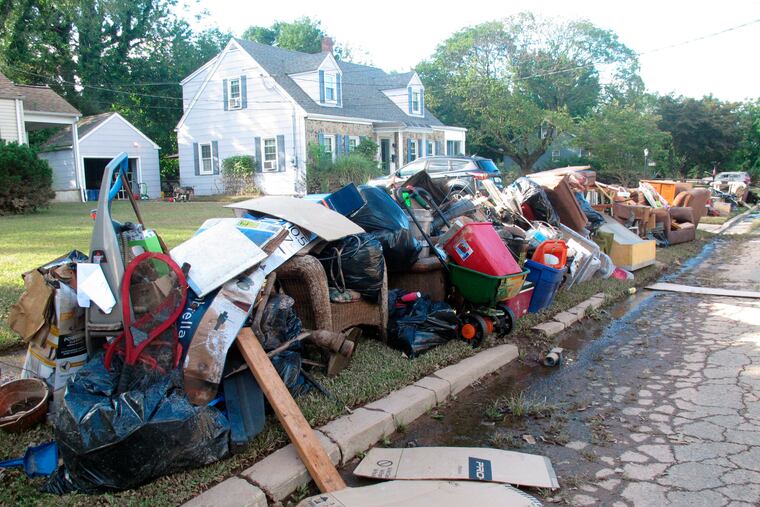Selling your New Jersey home? Soon you’ll have to disclose flood and water damage
Sellers, landlords will have to disclose if their properties were affected by flooding.

Up to five inches of rain fell overnight Dec. 17 in parts of South Jersey — and if any basements were damaged by flooding, owners could soon have to report it if they sell their home.
A new law goes into effect early next year requiring home sellers to note whether the property has had flood damage. Starting in March, sellers will have to fill out an updated disclosure form that asks whether a property owner has ever filed a claim for flood damage with any insurance provider, if the property has ever had “flood damage, water seepage, or pooled water due to a natural flood event, such as heavy rainfall, costal storm surge, tidal inundation, or river overflow” and if, so, how many times.
The existing disclosure form already asks whether a home has sump pumps, water leakage, a damp basement or crawl space, or mold.
Landlords will also be required to fill out a separate form to notify tenants that also asks about flooding in parking lots.
The law and forms are part of legislation that Gov. Phil Murphy signed into law aimed at addressing increasing flood risks under climate change.
The state is already experiencing increased property damage due to climate change, according to the New Jersey Department of Environmental Protection. That includes increasingly mild winters, more intense rainfall, and chronic flooding it says will only increase.
Though it’s difficult to pinpoint a single event such as climate change, this last month’s rains — unusually heavy for December — created havoc in parts of the state. The Delaware River Basin Commission reported that many South Jersey communities received two to three inches of rain over 24 hours, shutting down major roads such as the Admiral Wilson Boulevard.
Normal for that area is about 3.13 inches of rain from the start of the month through Thursday. Last Monday’s high of 62 was 18 degrees above normal, according to the National Weather Service. Some communities in the more southwestern part of the state received more than five inches of rain, causing tidal flooding.
“As we continue to live with the impacts of climate change in our communities, it’s essential that we inform prospective home buyers and renters of the risks in areas where they are looking to settle down,” Murphy said in an announcement of the updated seller’s disclosure form. “These new protections will enable prospective home buyers and renters to stay a step ahead when it comes to finding the safest residence possible for themselves and their families.”
What’s on the new disclosure form?
The new disclosure form, released this week, asks multiple questions about a property’s history with water. It asks whether a property has one or more sump pumps, if there are problems with the operation of a sump, if the homeowner is aware of leaks, or dampness or mold within a basement or crawl space. It further asks whether the homeowner has made repairs or taken measures to control water or dampness, and the date, location, and nature of the repairs.
Officials say this should give potential buyers and tenants an idea of a property’s history or risk of flooding. As a companion tool, they released an online map that allows a user to plug in an address and find out whether a property lies within a flood hazard area.
“Today we’re moving forward with groundbreaking protections for New Jersey home buyers and renters,” New Jersey Attorney General Matthew Platkin said. “The flood disclosure requirements we’re implementing under the new law are some of the strongest in the nation and will help New Jerseyans protect themselves, their families, and their property from the consequences of hidden flood risks.”
Shawn LaTourette, commissioner of the state’s Department of Environmental Protection, said it’s clear that precipitation and flooding are getting worse as a result of climate change.
“Too often, buyers and renters are unaware of the risks they face and make important decisions on where to live without any knowledge of a property’s flooding history or potential,” LaTourette said.
Sellers and landlords had been under no obligation to disclose a property’s history to potential buyers or tenants. Now, they have to make any disclosures before signing a sales contract, leases, or lease renewals.
What if I’m in a flood plain?
Sellers and landlords will also have to disclose whether a property is required by federal law to have flood insurance. They will have to say whether the property is within Federal Emergency Management Agency’s special flood hazard area, also known as a 100-year floodplain, or moderate risk flood hazard area, or 500-year floodplain.
The DEP has released an online Flood Risk Notification Tool for people to search a property by its address and find out whether it is within one of those FEMA-designated areas. Users can also get a view of sea level rise projections for a property. The tool will email a report to the user.